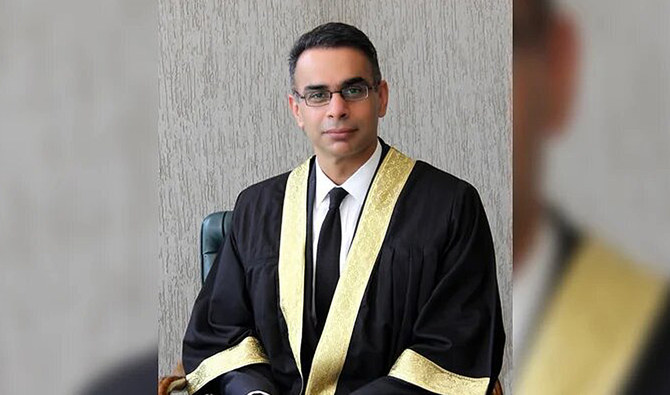ISLAMABAD: The Islamabad High Court (IHC) on Sunday rubbished a “malicious” social media campaign against one of its judges, Justice Babar Sattar, clarifying that he was not a dual national and that all his assets in Pakistan and the United States were legally owned.
The press statement from the Pakistani court came in response to recent social media posts that targeted the judge and members of his family. Some social media users had shared pictures of Justice Sattar’s and his family’s travel documents, suggesting that he was a US national and that he had minted assets after his elevation to the post of high court judge.
Justice Sattar is one of the six IHC judges who accused Pakistan’s premier spy agency, the Inter-Services Intelligence (ISI) of intimidating and coercing them over “politically consequential” cases in a letter written to the Supreme Judicial Council last month.
The letter grabbed headlines following which Pakistan’s Supreme Court took notice of the matter and started hearing the case.
The IHC said in its press release on Sunday that “untruthful” and “malignant” allegations against Justice Sattar were posted on social media along with details of his properties that were mentioned in his tax returns.
“Justice Babar Sattar has never had any nationality other than that of Pakistan,” the high court said. “He studied law at Oxford University as a Rhodes Scholar and pursued graduate education at Harvard Law School.”
The IHC clarified that Justice Sattar worked as a lawyer with a New York law firm and was issued the Permanent Resident Card while he was there in the US.
“He left his job in the US in 2005 and returned to Pakistan and has lived and worked in Pakistan since then,” the press release said.
The court said Justice Sattar’s wife and children are citizens of Pakistan and the US, adding that they had been living in the US till 2021 but returned to Pakistan after he was appointed as a
high court judge. It said that they are now living in Islamabad.
The high court said Justice Sattar’s mother is an educationist who established a school in Rawalpindi in 1992 as its sole proprietor. It added that the judge does not have any ownership interest in the school and is not involved with its management.
“Before being appointed a Judge, his law firm acted as legal adviser to the school and received retainer fee for its legal services,” the press release said.
It said that the judge owns real estate assets in the US and Pakistan that are mentioned in his tax returns. The press release said these assets were scrutinized by the Judicial Commission of Pakistan prior to his elevation as a judge of the high court.
“All real estate assets that he owns are either inherited or were acquired while he was a lawyer,” it said. “He has acquired no real estate assets since his appointment as a Judge. He is not
involved with the management of any business entity.”
The press release concluded by saying the IHC was committed to enforcing and upholding the code of conduct for high court judges, adding that it was accountable to the people as it was an institution that exercised public authority.












